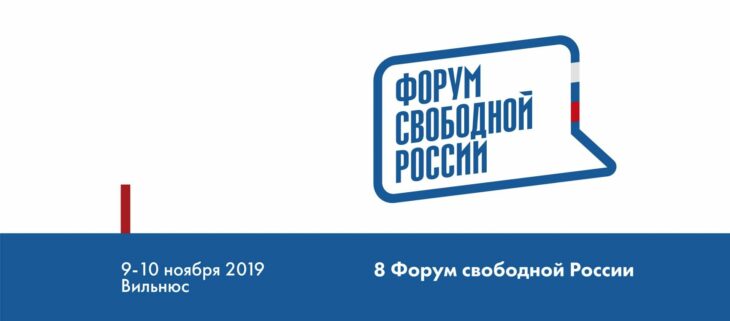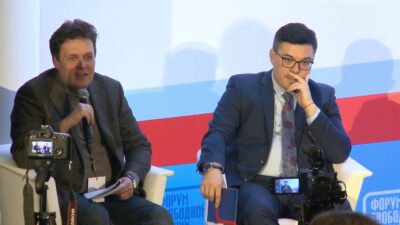
Saturday, November 9th
9:00 – 10:00
Registration of participants
10:00
Opening statement
10:15 – 11:30
“Repressive practices of the Putin regime”
- Transformation and development of the repressive apparatus under the evolution of the regime towards totalitarianism;
- Protest activity and its crackdown. How does the Kremlin suppress protests?
- Ways of self:organization of civil society and its protection from repression. How to organize an effective human rights advocacy?
Moderator: Daniil Konstantinov – political émigré, former political prisoner
Speakers: Oleg Sentsov – Ukrainian filmmaker, former political prisoner; Lev Ponomarev – human rights activist, the leader of the For Human Rights movement; Roman Popkov – journalist, former political prisoner; Irina Biryukova – lawyer of the Public Verdict Foundation
11:30 – 13:00
Has a “new political era” in Russia begun? Domestic political situation analysis and possible opposition strategies.
- The Moscow “election” and the “Moscow case” – summarizing the preliminary results. Does it make sense for a part of the opposition to take part in the various “elections” in Russia?
- Environmental protests in the Russian regions: should we expect a transition towards political demands in the upcoming year?
- Do protests in the republics of the Russian Federation (Buryatia, Kalmykia) demonstrate the growth of ethnic identity in these regions? What impact can this have on the future of Russian federalism?
- Is Russian society ready for massive political protests and confrontation with the state repressive machine? What should be the opposition’s strategy in this situation?
Moderator: Evgeny Kiselev – TV presenter, op:ed columnist
Speakers: Evgenia Chirikova – coordinator of activatica.org portal; Garry Kasparov – politician, chairman for the Human Rights Foundation; Ilya Ponomarev – politician, a former member of the State Duma of Russia; Marat Guelman – gallerist, op:ed columnist, art manager
13:00 – 14:00
Lunch
14:00 – 15:15
Dynamics of public sentiments in Russia.
- The socioeconomic situation in Russia and the prospects for its development in the short and medium:term.
- Is the “fridge” starting to triumph over the TV? If so, does it give reason to expect an increase in protest sentiment in Russia in the foreseeable future?
- What steps could the authorities make to restore the confidence of the Russian people?
- Do the “Putin myth” and the “Soviet myth” exist in Russian public consciousness? If so, how do they relate and what are the short and long term survival prospects of both?
Moderator: Dmitri Nekrasov – politician, economist
Speakers: Andrei Illarionov – economist, op:ed columnist; Anastasia Nikolskaya – psychologist, senior researcher at the Russian Presidential Academy of National Economy and Public Administration, assistant professor of psychology at the Moscow State University of Design and Technology; Maxim Trudolyubov – columnist for the International New York Times, Vedomosti, InLiberty; Igor Yakovenko – journalist, op:ed columnist, project manager for the International Public Tribunal
15:30 – 16:45
Culture Section: “What to read?” “Where to publish?”
Moderator: Marat Guelman – galerist, op:ed columnist, art manager
Participants: Tomas Venclova (Lithuania) – poet, literary critic, dissident and human rights activist; Alexander Gavrilov – literary critic; Alexei Tsvetkov – writer; Evgeny Kogan – journalist, writer; Elena Kogan – journalist
15:30 – 16:45 (Hall 2)
Round table of regional activists: “Does Russia need a new Treaty of Federation?”
16:45 – 18:00
New Munich. Did Putin benefit from the fatigue of the collective West?
- Does the return of the Russian delegation to PACE indicate the effectiveness of Putin’s foreign policy in the long run?
- “Steinmeier Formula” and the prospects for the development of the Russian:Ukrainian conflict in the Donbas.
- Putin’s Middle East Policy: unconditional success or anticipation of future problems?
Moderator: Andrei Sidelnikov – leader of the “Speak louder!” movement (London)
Speakers: Boris Reitschuster (Germany) – journalist, political observer; Ayder Muzhdabaev (Ukraine) – journalist; Jason Smart (USA) – political scientist; Emanuelis Zingeris – Member of the Lithuanian Seimas;
Sunday, November 10th
9:00 – 10:30
Working group: Roll Call of the regions – challenges, successes, prospects.
10:30 – 11:45
Thirty years after the collapse of Communist regimes in Eastern Europe: the crossroads of desovetization.
- The collapse of the communist regimes in Eastern Europe: the result of a long national liberation struggle or just an inevitable consequence of the collapse of the USSR?
- What is the secret to the success of countries that have successfully overcome the totalitarian:communist past? What is the difference between them and countries that have faced neo:Soviet revenge (Russia, Belarus) or “stuck” in the process of transformation (Moldova)?
- Did the West do everything in its power to help Eastern European countries (including Russia) break with the legacy of totalitarianism?
Moderator: Boris Reitschuster (Germany) – journalist, a political observer
Speakers: Garry Kasparov – politician, chairman for the Human Rights Foundation; Štěpán Černoušek (Czech Republic) – Czech Memorial, Chairman of the Gulag.cz Society; Mantas Adomėnas (Lithuania) – historian, Member of the Lithuanian Seimas; Evgeny Kiselev – TV presenter, op-ed columnist
12:00 – 13:15
Prospects for the transformation of Russian statehood
- Is it fair to call modern Russia an empire? If so, is it possible (and necessary) to transform it into a nation:state?
- How do Russia and the USSR relate? Should post:Putin Russia keep the preservation of succession with the USSR, or declare itself the successor of the Historical Russia that existed before 1917, or abandon all succession by starting statehood from scratch?
- The optimal form of government for future Russia.
- What impact will the Crimea question have on the historical prospects of Russia? Is its resolution possible in the foreseeable future?
- Is lustration a prerequisite for the transition from totalitarianism to democracy?
Moderator: Elena Galkina – political analyst, Ph.D. in History
Speakers: Igor Chubais – sociologist, publicist; Pavel Ivlev – lawyer, Executive Director of KRES Poliskola; Ivan Tyutrin – politician, cofounder of the Free Russia Forum; Daniil Konstantinov – political émigré, former political prisoner
13:15 – 14:00
Approval of documents and statements of the 8th Free Russia Forum. Voting on the “Putin’s List” updates.
14:00 – 15:00
Lunch
15:00 – 15:30
Putinburg – presentation of the book by Dmitry Zapolsky
15:30– 16:45
Belarus – Russia: Prospects and Threats of Integration
- What is the integration plan of Putin and Lukashenko?
- “Belarusian Defense” in the “chess game” of Putin and Lukashenko. What does the Belarusian leader bet on?
- Is it possible for the Kremlin to implement the “Ukrainian scenario” in Belarus?
- Export of nuclear power plants: a geopolitical weapon of the Kremlin or a path to energy independence?
- Defending sovereignty: the task for the intellectual elite or the wider civil society?
Moderator: Anastasia Dorofeeva – Chairman of the Green Party of Belarus
Speakers: Anatol Lyabedzka – politician, former chairman of the United Civil Party of Belarus; Andrei Ozharovsky – Russian physicist, op:ed columnist, Belarusian Anti-Nuclear Coalition; Andrey Okara – political strategist, political philosopher; Vladimir Matskevich – philosopher, co:founder of the “Fresh Wind” movement; Laurynas Kasčiūnas (Lithuania) – political scientist
16:30 – 18:00
“Who the West will help”
- Foreign investment in Russia and Ukraine: who wins the attention of foreign investors?
- Why do Western countries strengthen NATO while building the Nord Stream:2?
- How effective are Western sanctions?
- What is the likelihood of isolation of Russia? Future of technological and economic cooperation.
- How does the aggressive policy of the Kremlin affect the activities of foreign companies in Russia and Russian companies in the West?
- The use of investment projects abroad for the expansion of Putinism and the creation of a network of agents of influence in the West and East
Moderator: Ilya Ponomarev – politician, former Member of the State Duma of Russia
Speakers: Andrei Illarionov – economist, publicist; Dmitri Nekrasov – politician, economist; Mikhail Talanov – entrepreneur
18:00
Closing Statement of the 8th Free Russia Forum




